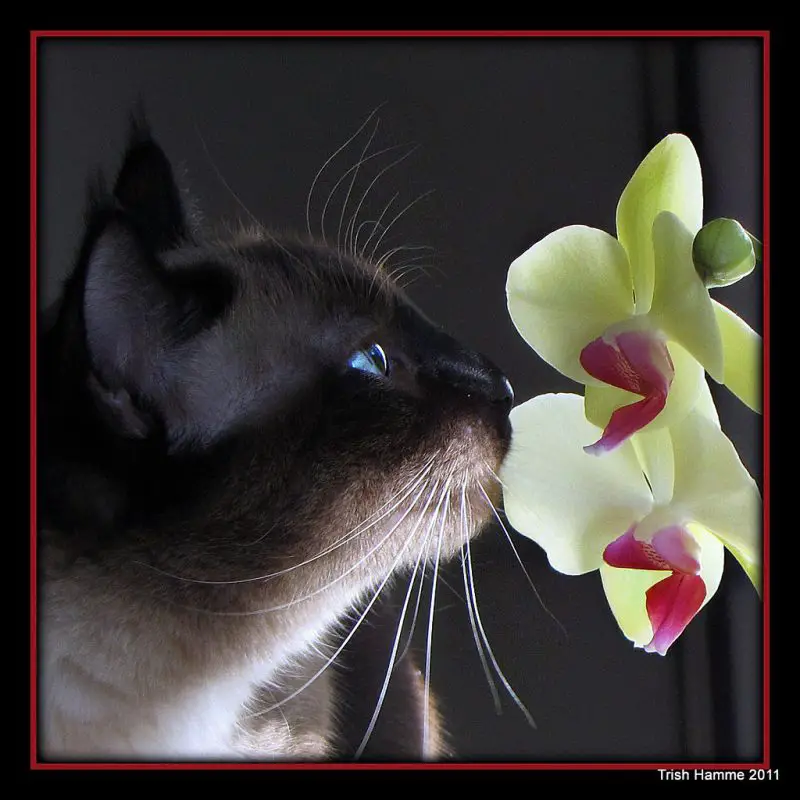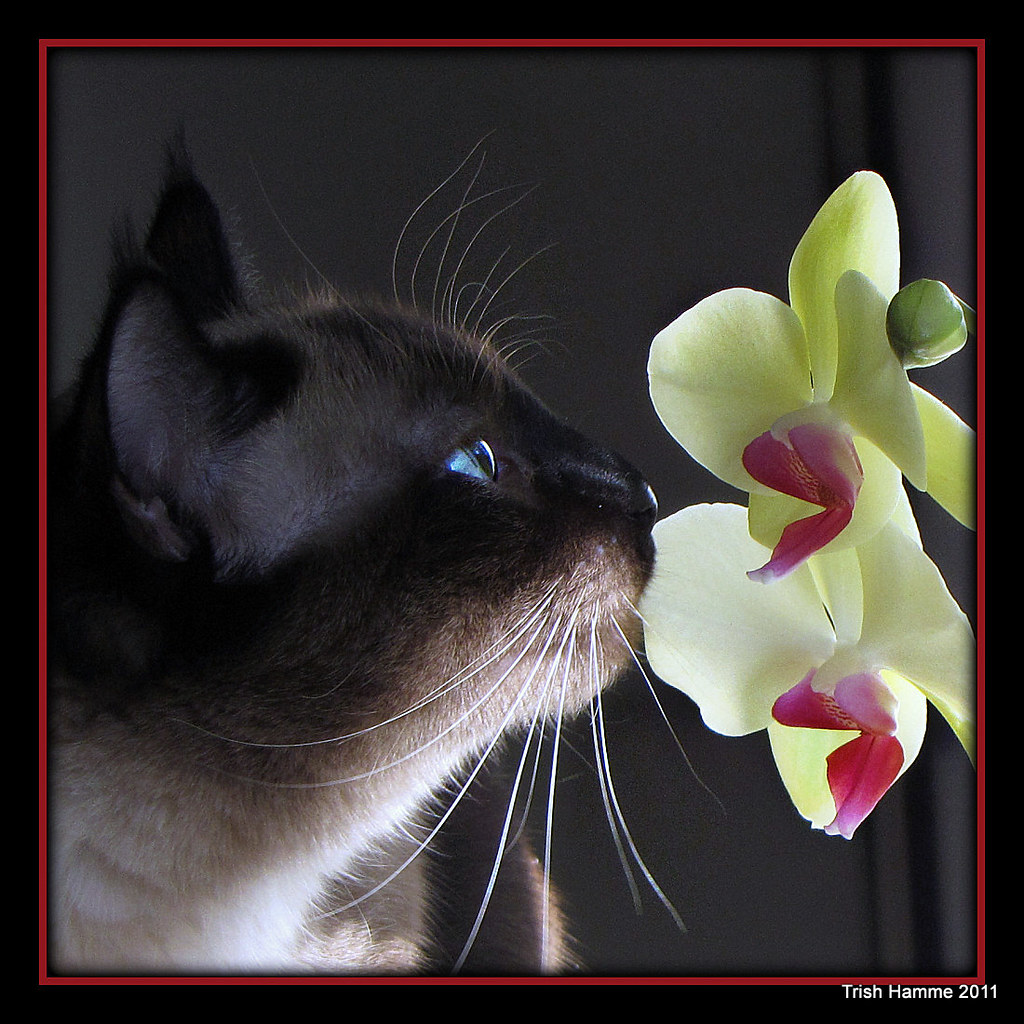So you caught your cat or dog nibbling on your orchids. Your first thought is to your orchid ok.
But the next thing you realize is you need to know are orchids bad for cats or dogs? We will tell you the answer in this article.

There are over 25,000 species of orchids so there could be an orchid that is poisonous to cats and dogs out there somewhere.
But it isn’t likely.
Phalaenopsis orchids are probably the most popular orchid most people have and according to the ASCPA, they are not poisonous.
Phalaenopsis Orchid
Additional Common Names: Moth Orchid, Moon Orchid
Scientific Name: Phalaenopsis sp.
Family: Orchidaceae
Toxicity: Non-Toxic to Dogs, Non-Toxic to Cats, Non-Toxic to Horses https://www.aspca.org/pet-care/animal-poison-control/toxic-and-non-toxic-plants/phalaenopsis-orchid
So you can probably relax. One exception might be blue phalaenopsis orchids because they are dyed blue. Are Blue Orchids Real? – Hydroponic Orchids
We don’t know what the blue dye actually is but it is safe to assume it is harmless because people come in contact with it.
The worst-case scenario is your cat or dog might get diarrhea or indigestion from it and hopefully won’t want a second taste of it.
Are Orchids Bad For Dogs?
Just like with cats orchids are not toxic to dogs. But some dogs will get into the potting mix.
If the orchid bark comes from redwoods it is an irritant that can cause digestive issues.
Cypripedium Reginae or the lady slipper orchid is known to cause skin irritation for dogs but it is not toxic.
Still, I pity the poor dog who eats it and gets a rash on its tongue.
There are other houseplants that are toxic to dogs and cats and should be kept away from pets.
Pothos is a very popular house plant that can be toxic to pets. Maybe that’s why it is also called devils ivy.
Keep Your Pets Safe
It’s your responsibility to keep your pets safe. You can’t expect them to know what is safe to eat and what is toxic.
It’s up to you to know what plants you have that could be toxic to your pets.
Toxic Plant List
The ASPCA provides a list of toxic and non-toxic plants and you should check the plants you have in your house.
Just because you wouldn’t eat it does not mean your dog or cat won’t. So please check out this list.
https://www.aspca.org/pet-care/animal-poison-control/toxic-and-non-toxic-plants
If your pet ate something you think might be poisonous or is making them sick there is a number you can call for help
ASPCA Animal Poison Control Center Phone Number: (888) 426-4435
Common Plants That Are Dangerous For Dogs And Cats To Eat
Here is a list for some common plants that are poisonous to cats and dogs.
10 common plants toxic to dogs and cats
| Plant name | Description | Symptoms include |
|---|---|---|
| Cannabis | Cannabis poisoning (from plants, leftover matter and edibles) is one of the most common plant poisoning vets see, especially in dogs.
Delta nine tetrahydrocannabinol affects cat and dogs’ neurological system. |
Incoordination, tremors, drooling, seizures, possible respiratory problems, depression, coma. |
| Lilies | Lilies (such as peace lily, calla lily, Easter lily and Tiger lily) are highly toxic and potentially fatal to cats. Some types are also toxic to dogs.
Avoid having any plant from the lily family in or around the home. And be mindful of gifted flowers. |
Vomiting, diarrhoea, lack of appetite, stomach pain, depression, difficulty swallowing, kidney damage, kidney failure, multiple organ failure. |
| Sago palms | Sago palms (cycads) are commonly found in tropical and ornamental gardens. All parts of the plant are highly toxic to dogs. Consumption of sago palm is often fatal.
Avoid having sago palms in and around your home if you have pets, and be extremely careful when removing them. |
Vomiting, diarrhoea, liver damage, liver failure, multiple organ failure. |
| Ivy | Many popular ivy plants, including English ivy and Devil’s ivy/Golden Pothos, have moderate toxicity to pets. | Mouth and stomach irritation, excessive drooling, foaming at the mouth, swelling of the mouth, tongue and lips, vomiting, diarrhoea. |
| Philodendrons | The philodendron family, which includes Swiss cheese plant, heartleaf and fiddle-leaf philodendron, have a toxicity level of mild to moderate for cats and dogs. | Oral irritation, pain and swelling of mouth, tongue and lips, excessive drooling, vomiting, difficulty swallowing. |
| Rubber tree plants | Some rubber tree plants (such as Japanese/Chinese/jade rubber plant and Indian rubber plant) are toxic to cats and dogs. | Decreased appetite, drooling, vomiting, diarrhoea, depression, skin irritation. |
| Aloe vera | Although considered a medicinal plant for humans, aloe vera’s level of toxicity is mild to moderate for cats and dogs. | Vomiting, diarrhoea, lethargy, depression, anorexia, tremors, change in urine colour. |
| Chinese evergreen | Chinese evergreen’s level of toxicity is mild to moderate, though symptoms can include liver and kidney damage. | Oral irritation, pain and swelling of mouth, tongue and lips, excessive drooling, vomiting, difficulty swallowing. |
| Asparagus fern | Asparagus fern, also known as emerald feather and lace fern, is mild to moderate in toxicity. | Allergic dermatitis, drooling, vomiting, diarrhoea, abdominal pain. |
| Lantana | Considered a weed in Australia, lantana is a colourful, extremely toxic plant for cats and dogs. | Depression, vomiting, diarrhoea, weakness, loss of appetite, shock, abdominal swelling, paralysis, possible liver failure. |
https://www.abc.net.au/everyday/common-poisonous-plants-to-dogs-and-cats/10105914
Are Orchids Bad For Cats Or Dogs Final Thoughts
If you are worried about orchids being toxic for your pets you have nothing to worry about.
Orchids are not toxic to cats or dogs.
But there are many other houseplants and outdoor ornamentals that can be. It is up to you to make sure your pets stay safe.
Read more: Are Orchids Hard To Take Care Of? Easy Growth Formula
This post contains affiliate links.



